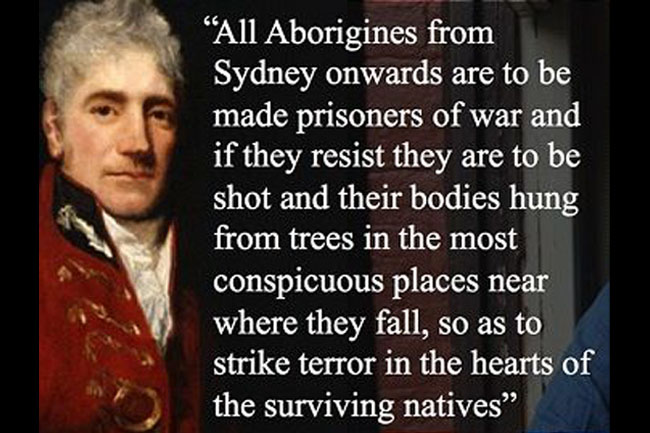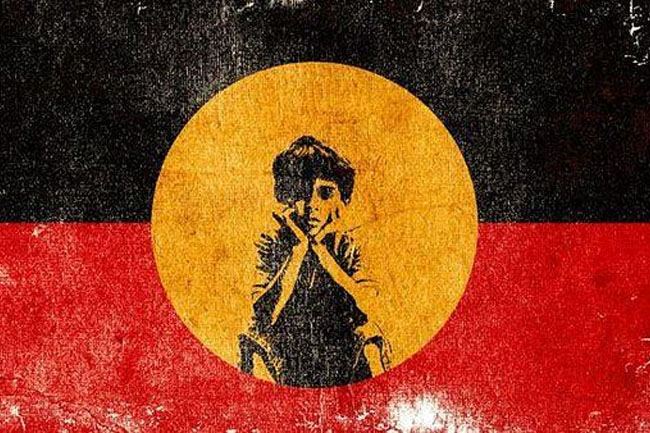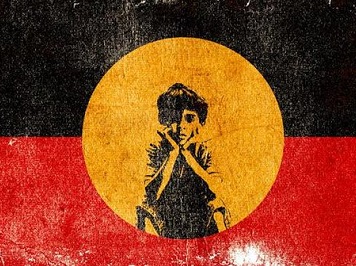A report released on last month by the UNSW paints a bleak picture of justice for Indigenous Australians, particularly those with mental health disabilities. The administration of "justice" has failed my people says Natalie Cromb, IA's Indigenous affairs editor.
AUSTRALIA IS racist.
A significant portion of Australians will get defensive at that statement and say, “well I’m not, it’s not fair to say we all are,” but it is those Australians who fail to see how racist this country is and it is those Australians who are truly ignorant to how widespread racism is.
Racists are not a minority in this country. Racists govern this country. Racists administer “justice” in this country. Racists sit on juries. Racists write for the mainstream press.
Racism is not simply the uneducated goon hanging out with Australian flags and chanting against immigration, racism is a perceptible thing that targets Indigenous Australians more than any other group in Australia and results in black incarceration and the worst level of black deaths in custody since South African Apartheid.
The laws enacted in this country are racist; the criminal laws and sentencing regulations unfairly target Indigenous people, the discrimination laws make it easy for people to unfairly target and attack Indigenous people under the guise of “free speech” and the administrative procedures and lack of legal assistance funding make it impossible for Indigenous people to obtain any sense of procedural fairness or justice.
The legal system in its assessment of matters fails the Indigenous people of Australia because not only are there enormous sentencing disparities between Indigenous people and non-Indigenous, it often fails to consider the mens rea of offences and has a significant portion of mentally ill and those with cognitive deficiencies incarcerated.
The policing of the laws is abhorrent; the very people who are duty bound to serve and protect are, frankly, sanctioned abusers. Before you all get up in arms about how they risk their lives for us, look at the evidence; Ms Dhu, Terence Briscoe, Corey Barker, Mulrunji Doomadgee to name but a few in recent history.
Inquest into death of Ms Dhu in police custody exposes institutional racism, writes @NatalieCromb. https://t.co/kwIdtKwFvn
— IndependentAustralia (@independentaus) November 24, 2015
We have Indigenous people who are incarcerated for things as minor as a $1,000 fine or public intoxication come to harm at the hands of the police and those police are cleared of any wrongdoing, but a non-Indigenous Australian that killed a nine year old Indigenous boy can walk away without a custodial sentence.
Indigenous people in Australia all have their own stories about encounters with the criminal justice system from the policing through to their incarceration. The one thing they all have in common is that their experiences as an Aboriginal and/or Torres Strait Islander differs significantly to that of their non-Indigenous counterpart.
The disparity between Indigenous and non-Indigenous is glaring but there are so many that continue to discount the views and experiences of Indigenous Australia. To maintain that viewpoint in light of the abundant evidence available is inexcusable and points to the entrenched racism within this country; people are racist but that’s okay because we are the “lucky country” and in the “lucky country” we can speak our minds.
This perspective is blasted into the faces of Indigenous Australians every day and I would be lying if I said it didn’t hurt. I am young and somewhat angry at injustice, but I know a great many of my elders feel utterly destroyed by decade upon decade of racism on top of the trauma lived.
Indigenous people in Australia suffer uniquely and because of the complexity of suffering given there are far too few services available to assist with diagnosis, treatment and long term plans for those of us with mental or cognitive issues.
Trans-generational trauma is a pervasive problem because not only do we have a generation of elders hurting from atrocities committed under the White Australia Policy but we have every generation since then suffering from the effects of broken families from depression, anxiety, suicide and issues with building and maintaining relationships to cognitive issues from alcohol or drug abuse causing delays or damage, foetal alcohol syndrome and brain damage from injuries.
Add to this the devastating lack of resources to not only diagnose and treat, but to even provide appropriate social resources to assist in avoidance of becoming statistics.
Professor Eileen Baldry, a criminologist with the School of Social Sciences at UNSW, authored the report with colleagues Ruth McCausland, Leanne Dowse and Elizabeth McEntyre and shed light on the reality of more than 670 Indigenous prisoners over the last 30 years of interactions with police and the Court system.
The participants all suffered from mental health disorders like depression, schizophrenia, psychosis or cognitive disabilities such as intellectual disability, brain injury or foetal alcohol syndrome.
A study entitled ‘A predictable and preventable path: Aboriginal people with mental and cognitive disabilities in the criminal justice system (the Report),’ released on 30 October 2015 by the University of New South Wales (UNSW) paints a bleak but accurate picture of justice for Indigenous Australians, particularly those with mental health or cognitive disabilities.
The Report was summarised by the authors in an opinion piece for The Conversation:
The Report found Aboriginal people with mental and cognitive disability are forced into the criminal justice system early in life. Coming from poor and disadvantaged backgrounds, they receive little support from community and disability services or the education system.
These people are often seen as badly behaved or too hard to control, and left to police to manage. While this also applies to non-Indigenous people with disability from disadvantaged backgrounds, we found it’s much more serious for Indigenous people.
The authors continued:
Indigenous people in the group we studied were 2.6 times more likely to have been in out-of-home care as children. Their age of first contact with police was 3.4 years younger than non-Indigenous people, and they had a higher rate of contact with police as both victim and offender. Indigenous people were 2.4 times more likely to be in juvenile justice custody than non-Indigenous people. And they had higher numbers and rates of convictions and more episodes of remand in prison (unsentenced).
Indigenous people had higher rates of hospital admissions and were 1.2 times more likely to have been homeless – in a group with very high rates of homelessness generally. Those with complex needs (multiple diagnoses and disability) – particularly women – were the most disadvantaged. And Indigenous people from highly disadvantaged areas, especially regional and remote areas, fared the worst.
The authors of the report suggest that there are four main factors for these glaring results; first that people simply do not understand what a cognitive disability is, there are high levels of stress in Aboriginal communities due to socioeconomic factors and trans-generational trauma from governmental policies; many Aboriginal people in the criminal justice system have complex support needs and, finally, there is a lack of appropriate resources and support for Aboriginal people suffering with mental health and cognitive disability issues and all of these factors equate to what is a demonstrable breach of human rights.
It also begs the question of how the prosecution is able to satisfy the mens rea requirements of a lot of offences and how the judicial officers are able to make judgments and assessments without not only adequate training but, simply, understanding.
The report suggests that early diagnosis of mental health issues or cognitive disabilities coupled with the appropriate support and treatment can prevent a significant number of Aboriginal sufferers ending up in the criminal justice system’s revolving door. This revolving door impacts Indigenous people more than non-Indigenous people due to the lack of legal assistance funding and the fact that the judicial system finds it unpalatable to treat Indigenous people as individuals deserving of individual justice that is afforded to non-Indigenous people.
Indigenous people are targeted by the laws in this country and the administration of “justice” is failing my people.
You can follow Natalie Cromb on Twitter @NatalieCromb.

This work is licensed under a Creative Commons Attribution-NonCommercial-NoDerivs 3.0 Australia License
@NatalieCromb Keep up your good work. Every little crumb matters in a starving wilderness.
— LookThink Clued Arc (@ERN_Malleyscrub) November 23, 2015
Monthly Donation
Single Donation
Subscribe to IA for just $$ a month.









